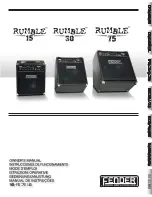
Notes
1.
UHF signal handling capability is given for 5 analogue TV channels plus up to 6 DTT
multiplexes at
≤
-
14
dB relative level.
2.
The first (higher) figure is for analogue signals and the second (lower) is for digital
(16
–
or
64
-
QAM).
3.
Rejection figures are given relative to the nominal passband gain.
4.
Absolute minimum voltage, measured to the bottom of the ripple present.
5.
Highest recommended mean voltage for operation over the full temperature range.
6.
Eye load should be restricted to 80 mA or less when using PROPSU112X power unit (see
text).
7.
Both UHF preamp and IR eye power outputs have fold
-
back short
-
circuit protection, but not
overload protection. It is the installer
’
s responsibility to ensure that the stated current
ratings are not exceeded.
Certain features of this amplifier are the subject of UK patent application GB 2425443.
RF characteristics
FM ANT input
DAB ANT input
UHF input
Signal frequency range
87.5 .. 108 MHz
210.5 .. 230 MHz
470 .. 862 MHz
Forward gain
1.5 dB
4 dB
4.5 dB
Return path gain
-
-
3 dB (Mode 2 only)
Noise figure, typical
4 dB
3.5 dB
2.5 dB
Output capability
-
-
82 dB
μ
V
Recommended
input signal levels
Maximum
70 dB
μ
V
70 dB
μ
V
78/63 dB
μ
V
2
Minimum
50 dB
μ
V
30 dB
μ
V
58/43 dB
μ
V
2
Isolation between outputs
≥ 30
dB
≥ 27
dB
≥ 24
dB
Input filter
rejection
3
for the frequencies
(f) stated
≥ 18
dB,
f
≤ 72
MHz, f
≥ 150
MHz
≥ 22
dB, f
≤ 145
MHz, f
≥ 305
MHz
≥ 26
dB,
f
≤ 400
MHz
Power requirements
Mode 1
Mode 2
DC power: voltage limits
8.5 .. 18 V
10.5 .. 18 V
Current loading
Amplifier only
80 mA
120 mA
Full system
110 mA (incl. 30 mA preamplifier load)
220 mA (incl. 100 mA total 'eye' load)
External power output
s
7
UHF preamp: 5V approx. at 30 mA
max.
IR 'eye': 9V approx. at 10 mA max.
(x10)
General characteristics
Signal connector type
Type
-
F (IEC 60169
-
24)
Operating temperature range
.
-
10 .. +40°C
Technical Data proAMP310X
Fig.2(a)
-
example Mode 2 application with remote power unit.
Mode 2 return
-
path mode (orange LED):
this mode is applicable when using RF OUT
-
2 of a Sky
satellite receiver, PVR or a similar device. This will then allow remote infrared receiver eyes (such as
the PROception PROSAT1EYE
Mk
2) to communicate with the Sky box, so that the Sky receiver can
be controlled from a remote viewing location.
Powering
Mode 2 is automatically enabled when the amplifier detects the presence of 9V (or higher) DC at its
UHF input (see the following section for further details). In this mode the LED indictor changes from
green to orange and a voltage (approx. 9
V DC) is present at each output for powering a remote
infrared receiver.
Infrared receiver power is individually short
-
circuit protected, so that a DC short at any output will
not affect operation of remote control via other outputs.
Fig.2(a)
shows a typical Mode 2 application with power provided by a PROPSU112X power unit
connected in the UHF return feed from the Sky receiver.
Fig.2(b)
shows a similar installation to Fig.2(a), except that power is provided by an AC/DC mains
power adaptor adjacent to the amplifier.
Magic Infra
-
Red Eye Count
When using the remote powering option with the PROPSU112X the total number of infrared
‘
eyes
’
on the system may need to be restricted. The PROPSU112X is rated to supply a maximum of 200mA
and approximately 120mA is drawn by the amplifier itself. Thus the total
‘
eye load
’
is limited to
80mA. This means that a maximum of eight
‘
industry
-
standard eyes
’
(each consuming about 10mA)
may be connected to the amplifier outputs. This restriction is removed if the
PRO
ception
PROSAT1EYE Mk 2 eye is used, since this consumes less than 5mA. Up to 10 eyes may be connected
without restriction when using the PROPSA125 AC/DC mains power adaptor.
Fig.2(a)
-
example Mode 2 application with remote power unit.






















